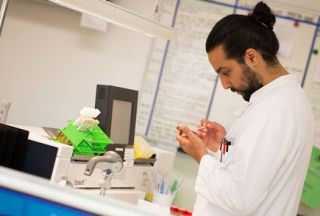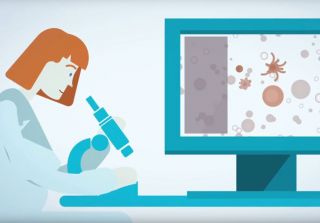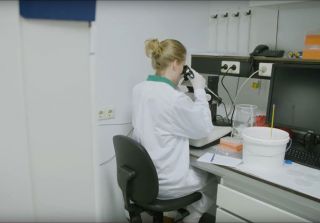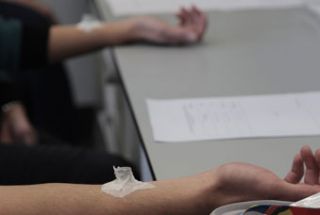Video item LUMC
New vaccines and medicines
World-wide millions of people suffer from infectious diseases, such as malaria, schistosomiasis and hookworm. In addition, increasing resistance of micro-organisms makes it hard to treat bacterial infections. At the LUMC researchers are working hard to combat these infections.
In order to test new vaccines and medicine as quickly and efficiently as possible, the LUMC infects healthy human volunteers with these parasites under controlled conditions, so as to test vaccines and new medicines. This is called ‘Controlled Human Infections’.
Malaria
Malaria
Malaria still is a big problem worldwide. Each year half a million children die of this disease. The Parasitology Department of the LUMC is working hard on the development of a promising vaccine. In 2018 we have tested a new vaccine together with the Radboud University Medical Center and the US biotech company Sanaria.
In February 2020 we have started testing a novel antimalaria medicine together with the CHDR as commissioned by Merck. In order to test the effect of the medicine quickly and cheaply, healthy volunteers are given the new medication and are subsequently deliberately infected with malaria. This sounds scary but is not dangerous. The volunteers are monitored carefully and are immediately given anti-malarial medication as soon as malaria is diagnosed. For more information about participation in this study and new studies, please check www.vaccinonderzoek.nl.
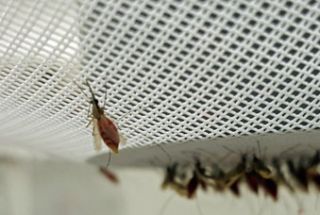
Video item LUMC
Hookworm
Hookworms are parasites living in human small intestines. Between 600 and 700 million people have been infected with hookworms worldwide. These parasites are a major health problem particularly in Africa and South-East Asia. High burden infections for a longer time can cause iron deficiency, anaemia and a too low protein level. This can result in tardy development and malnutrition in children.
The Parasitology Department of the LUMC is working on the development of vaccines against hookworm. In order to test these vaccines as quickly and cheaply as possible, Dutch volunteers are infected with hookworms. Administering a small number of worms will not result in iron or protein deficiency in healthy human volunteers.
Would you like to participate in this study? Then please enter as a test subject.
Treatment with healthy bacteria
Treatment with healthy bacteria
The LUMC offers the opportunity to donate faeces and urine. These contain healthy bacteria that can help prevent intestinal or urinal infections in other people.
Urinary tract infection
Almost 1 in 2 women will suffer from a urinary tract infection during her life. Such an infection is caused by bacteria. These bacteria can become immune to antibiotics. That is the reason why researchers at the LUMC are investigating novel treatments without antibiotics.
Some women get urinary tract infections repeatedly. This is possibly caused by the bacterial composition of the bladder. Researchers of the Infectious Diseases and Medical Microbiology Departments recently have started a new study. They wish to give the urine of healthy women to women suffering from urinary tract infections. This ‘healthy’ urine has to reset the composition of the bladder bacteria so as to prevent any further infections.
Would you like to participate in this study? Then please enter as a test subject.

Video item LUMC
Schistosomiasis
Schistosomes are parasitic worms found in Africa, Latin America and South-East Asia. World-wide, 200 to 400 million people have been infected with this parasite that reproduces in fresh water snails. The parasite develops into a kind of larva in the snail, which is excreted in the water. These larvae penetrate human skin and develop into worms in our bodies.
Human volunteers are infected with male worms which cannot produce eggs without females. As a result, the damaging effects of a schistosome infection are avoided. The development of worms can be tested with blood and urine tests, making it possible to in the future test new vaccines and medicine. Currently, we are not yet in this stage. Researchers at the Parasitology Department are currently searching for the right infectious dose.
Would you like to participate in this study? Then please enter as a test subject.
Faeces transplantation
Faeces transplantation
Patients undergoing kidney transplantation are at high risk for infections with intestinal bacteria. In some patients these bacteria are immune to antibiotics.
That is the reason why the LUMC is currently investigating if these patients can get rid of the resistant bacteria with a faeces transplantation. In such studies these patients receive donor faeces with healthy intestinal bacteria. This RESET study will start soon.
